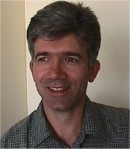|
Plenary
Lecture
Applications of Chaotic and Random Sequences for Secure
Communication Systems and Networks

Professor Stevan Berber
Department of Electrical and Computer Engineering
Faculty of Electrical Engineering
The University of Auckland
Auckland
New Zealand
E-mail:
s.berber@auckland.ac.nz
Abstract: The development of direct sequence spread
spectrum systems allowed design of code division
multiple access systems (CDMA), which are based on the
application of orthogonal sequences to multiplex users’
information. Initially the design of these systems was
based on application of spreading sequences like short
and long pseudo-random sequences, Walsh functions or
wavelets. In recent years, the non-binary sequences have
been applied in these systems, primarily chaotic
sequences produced by chaotic maps or random sequences
produced by the random number generators. This lecture
presentsresults of research conducted in recent years
related to the theoretical analysis, simulation and
practical design of systems that use non-binary
spreading sequences.In particular the characteristics of
chaos based systems for a single and multiple users in
the presence of noise and fadingarepresented.Due to the
random nature of sequences generated, the
synchronization of these systems is a particular problem
that attracted significant attention in communication
community. The lecture will present the latest findings
related to the methods of efficient synchronisation of
these systems. Due to the random nature of orthogonal
sequences, which are used to spread the message signal,
these systems can be used for secure signal transmission
and protect the information content from jamming and
interception. It will be shown, using example designs in
DSP technology, that the theoretical analysis of these
systems is demanding, but the design and implementation
of the simulators and devices based on this theory are
possible. In addition, the possible applications of
these systems in wireless sensor networks will be
addressed.
Brief Biography of the Speaker:
Dr Stevan M. Berber was born in Stanisic, Serbia, former
Yugoslavia. He completed his undergraduate studies in
electrical engineering in Zagreb, master studies in
Belgrade, and PhD studies in Auckland, New Zealand.
Currently Stevan is with the Department of Electrical
and Computer Engineering at Auckland University, New
Zealand. He was appointed Visiting Professor at the
University of Novi Sad in 2004 and Visiting Scholar at
the University of Sydney in 2008. His teaching interests
are in communication systems, information and coding
theory, discrete stochastic signal processing and
wireless sensor and computer networks.His research
interests are in the fields of digital communication
systems and signal processing with the emphasis on
applications in CDMA systems and wireless computer,
communication and sensor networks. He is the author of
more than 80 refereed journal and conference papers, 8
books and 3 book chapters. Hi filed three patent
applications. Dr Berber is a referee for papers in
leading journals and conferences in his research area.
He has been leading or working on a large number of
research and industry projects. Dr Berber is a senior
member of IEEE, a member of New Zealand Scientists, and
an accredited NAATI translator for English language.
|
